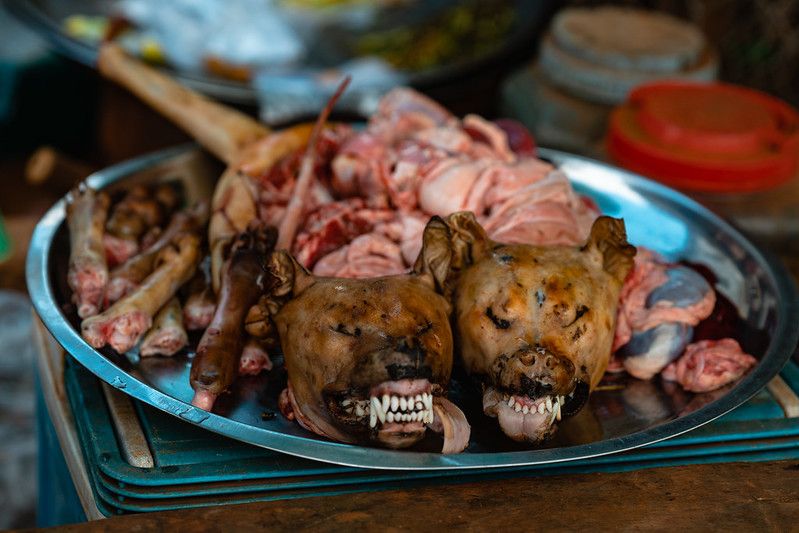Dog meat ban in South Korea after successfully passing a new bill
An age-old tradition of consuming dog meat in South Korea finally meets an end for a new era of compassion. It is a historic triumph for animal welfare since South Korea’s parliament recently passed a groundbreaking new bill banning the consumption and sale of dog meat. The dog meat ban in south korea is met with cheers from activists. It signifies a turning point in the fight against the controversial dog meat industry. This decision shows the growing importance of animal welfare and the need to protect our furry friends.
A revealing 2018 Global News investigation exposed the harsh reality of the dog meat trade in South Korea. It highlighted an astonishing 17,000 dog meat farms in the country. During this long fight, many dogs who were destined for slaughterhouses have been given a second chance at life. These rescued innocent dogs have been transported to new loving homes in Canada.
The dog meat ban popularity extends beyond South Korea to other regions engaging in the dog meat trade. Countries such as Philippines, Taiwan, Nagaland, and various cities in China have also favored bans on the sale of canine meat.
Dog meat consumption in south korea

For countless centuries, South Korea has been a country where dog meat is consumed. When served in stews like Boshintang, it is frequently regarded as a delicacy. Dog meat is cooked with various veggies and seasonings in this Korean meal. The stew is frequently promoted as having several health advantages, including strengthening the immune system.
In the past, eating dog flesh was thought to increase stamina during the hot Korean summer. However, the tradition has become uncommon, mostly confined to a few restaurants and older people. As criticism of the methods used in dog slaughter has increased, more Koreans are thinking about owning dogs as family pets.
Statistics indicate that around 1,100 dog farms in South Korea annually produce hundreds of thousands of dogs. Those dogs are destined for selling in the market and consumption in restaurants nationwide. Dog meat is commonly enjoyed as a seasonal delicacy during the summer as an energy boost to combat the heat.
Objections raised by animal welfare

Animal activists have objections that many dogs are killed in cruel ways, like electrocution or hanging, for their meat. Breeders and traders argue that there have been improvements to make the killing more humane. Jeung Seung-Yong the president of a South Korean animal welfare group named Catch Dog mentioned that it took decades of campaigning to achieve the ban. Jeung’s group has closed down 250 dog farms and rescued 5,000 dogs since it started in 2019.
President Yoon, who loves animals and has adopted several stray dogs and cats with First Lady Kim Keon Hee, supports the ban. First Lady Kim is also against eating dog meat. Activists see the passing of this bill as a significant achievement, calling it “history in the making.” JungAh Chae, the executive director of Humane Society International/Korea, approves of the bill, stating that most Korean citizens now reject eating dogs. She hopes that South Korea can move towards a dog-friendly future and leave the cruel treatment of dogs in the past.
A survey was done on Korean people
To know the sentiments of Korean people towards dog meat eating a survey was conducted. This survey was done by Nielsen Korea of Animal Group Humane Society which gave an astonishing public response. About 54% majority said they have never consumed dog meat and will avoid eating it in the future. Among those who were in their 50s, 64% think animal cruelty is the main reason to ban the industry.
Most (86%) people won’t or probably won’t eat dog meat in the future. A majority (57%) support banning the dog meat industry. Only 7% point to unsanitary conditions as their main reason. Overall, 68% believe all dogs, whether raised for meat or as pets, should receive equal care and protection. This survey done on Korean people gave hope to animal welfare to continue their fight against animal cruelty.
Dog meat ban in south korea by law

South Korea’s parliament has recently adopted legislation that outlaws the breeding, slaughtering, and sale of dog meat, a traditional practice that has long been a source of embarrassment for activists. Offenders can now face penalties of up to three years in prison or fines amounting to 30 million Won ($23,000). The bill received unanimous approval, with a vote of 208-0 in the Korean National Assembly. This groundbreaking ban is scheduled to take effect in 2027, allowing a transition period for farmers and merchants to adapt or close their establishments.
Existing dog meat farmers in South Korea are mandated to submit a closure plan for their facilities to the local government within the next six months. Governmental compensation is potentially available for those in the dog meat industry who are compelled to shift their livelihoods, encompassing farmers, butchers, and restaurateurs. Importantly, the consumption of dog meat itself will remain legal despite these regulatory changes. The final approval of the dog meat ban law was given by President Yoon Suk Yeol who himself is a canine lover.
Protest against this new law
On January 9, 2024, South Korea’s parliament enacted legislation criminalizing the breeding or slaughtering of dogs for consumption. The law is set to take effect in 2027 banning the sale and distribution of dog meat. Those found guilty of selling or breeding dogs for meat could face a maximum prison sentence of two years. The penalty for slaughtering dogs is up to three years as per the law.
However, the protest against this new law has already started among dog meat farmers and restaurant owners in South Korea. They argue that the controversial trade would naturally diminish over time as their main clients were mostly older adults. They believe that changing attitudes towards dogs and the younger generation’s preferences would already end the dog meat industry. With the new legislation in place, these individuals argue that they are left with no option but to relinquish their businesses.

